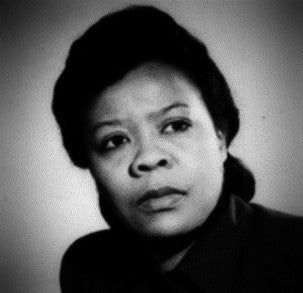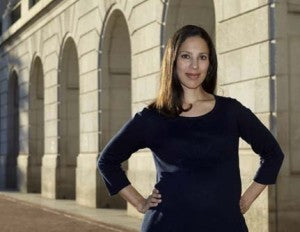To say that black women are a rare breed in science, technology, engineering and science (STEM) would be an understatement. In 2012, white women racked up 6,777 PhDs in STEM fields, according to the National Science Foundation. African American women, on the other hand, earned 684. (White men, for comparison’s sake, received 8,478.)
In honor of Black History Month, here are 13 African-American women, from yesteryear to today, who defied insurmountable odds and continue to pay the way forward for the girls who would succeed them. May we see more of them, may we be inspired by them, may we raise them.
(Updated February, 2023)

Image source: Brownstoner
1. Susan McKinney-Steward
Born in Brooklyn in 1847, Susan McKinney-Steward was the third black woman to earn a medical degree in the United States and the first in New York State. She found her calling in medicine after her brother’s death in the Civil War and a cholera epidemic that swept through New York City in 1866 and claimed the lives of 1,137 people. Though the daughter of a wealthy pig farmer, she paid her own way through medical school by offering singing lessons. She also graduated valedictorian.
McKinney-Steward maintained a lifelong focus on prenatal care and childhood disease. Besides running her own practice in Brooklyn, she co-founded the Brooklyn Women’s Homeopathic Hospital and Dispensary and worked as college physician at the African Methodist Episcopal Church’s Wilberforce University in Ohio. She also sat on the board of and practiced medicine at the Brooklyn Home for Aged Colored People.

Image source: Wikipedia
2. Lyda Newman
Lyda Newman, a hairdresser by trade, was a woman of many talents. One of the organizers of an African-American branch of the Woman Suffrage Party, which fought for women’s right to vote, Newman canvassed neighborhoods and organized meetings to raise awareness for gender equality.
Newman was also the first person to create a hairbrush that used synthetic bristles instead of animal hair. In 1898, she received a patent for her hairbrush, which included recessed air chambers to improve ventilation and a removable compartment for collecting—and emptying—debris.

Image source: Tumblr
3. Bessie Blount
Bessie Blount was a physical therapist from New Jersey who invented a device that helped handicapped soldiers, returned from the Second World War, feed themselves if they had lost limbs. Her electric device-dispensed liquified food through a tube to a mouthpiece that could be used whether its user was sitting up or lying down. Biting down on the tube signaled the machine to deliver another mouthful.
In 1951, Blount patented a portable receptacle support, featuring a brace that could hang around the neck, along with an attachment for a cup or bowl, that allowed someone with arm injuries to hold something close to his or her face. Working in hospitals led Blount to observe a relationship between physical health and handwriting characteristics. Expanding on this, she published a technical paper of “medical graphology,” which jump-started a career in handwriting analysis and forensics.

Image source: Medium
4. Aisha Bowe
Aisha Bowe ignored the advice of her guidance counselor, who suggested a career in cosmetology. Instead, she pursued degrees in aerospace engineering before winding up at NASA, where she worked as a mission engineer while mentoring students in her role as liaison to the Mathematics, Engineering, Science Achievement (MESA) program.
Today, Bowe is the co-founder and CEO of STEMBoard, a Certified Economically Disadvantaged Women-Owned Small Business that creates software solutions for government and private-sector clients. The organization also runs educational workshops to expose historically underrepresented youth to technology concepts such as coding and engineering.

Image source: Wikipedia
5. Aprille Ericsson-Jackson
Aprille Ericsson-Jackson is no stranger to firsts. She was the first African American woman to receive a Ph.D. in mechanical engineering from Howard University and the first African American woman to receive a Ph.D. in engineering from the NASA Goddard Space Flight Center.
With more than a decade of experience in structural dynamics and controls of spacecraft missions under her belt, she helps manage science instruments such as the Advanced Topographic Laser Altimeter System (ATLAS), which uses lasers to measure ice sheet depth and the height of vegetation canopies. She is also the instrument manager for a proposed mission to bring dust back from the lower atmosphere of Mars back to Earth.

Image source: Wikipedia
6. Nola Hylton
A veteran cancer researcher, Nola Hylton played an integral role in the development of MRI technology for the detection and diagnosis of breast cancer. She was among the first group of scholars named the Susan G. Komen for the Cure’s Scientific Advisory Council and co-leader for the U.S. Department of Health and Human Services’ Women’s Health International Group, where she identified and addressed barriers to clinical dissemination of breast MRI.
Hylton also served as the institutional principal investigator of the adultmultclub NCI International Breast MRI Consortium, the first large multi-center clinical trial evaluating breast MRI for breast cancer diagnosing and staging.

Image source: Wikipedia
7. Ashanti Johnson
Held up as one of the leading oceanographers of her generation, Ashanti Johnson is the first African American female chemical oceanographer (ever!) and the first African American to earn a Ph.D. in oceanography from Texas A&M University. For the better part of two decades, Johnson has worked to bridge the gap for historically underrepresented communities in STEM fields through programs such as Minorities Striving and Pursuing Higher Degrees of Success in Earth System Science, the Classroom and Community Engagement and Mentoring Program, and the new MS PHD’S-GEO Research Experience for Undergraduates Professional Development Program.
As an associate professor of earth and environmental sciences at the University of Texas at Arlington, Johnson uses various biogeochemical indicators to interpret past events that have impacted the marine, estuarine, and freshwater environments in the Arctic and the coastal regions of Georgia, Florida, and Puerto Rico. Johnson is also the chief of science and research at Black Girls Dive, an organization that inspires young girls and women to explore aquatic-based recreation activities and career opportunities, and the CEO and superintendent of Cirrus Academy Charter School, which employs an integrated, hands-on curriculum based on STEAM principles for kindergarten through 12th grade.

Image source: Black Enterprise
8. Tanya Moore
Berkeley native Tanya Moore received a Ph.D. in biostatistics at the University of California, Berkeley. After a postdoctoral stint at the University of California, Los Angeles, Moore headed home, where she joined Berkeley’s public health division to address health inequities.
In her current role as an education and youth services specialist, Moore works with city departments, the Berkeley Unified School District, UC Berkeley, and community organizations on joint initiatives to end academic achievement disparities between racial and socioeconomic groups in Berkeley’s public schools. Moore also co-founded the Infinite Possibilities Conference to support and promote underrepresented minority-women mathematicians.
Image source: Jetmag

9. Aletha Maybank
The associate commissioner at the New York City Department of Health and Mental Hygiene, Aletha Maybank envisions neighborhoods where everyone eats healthful foods, plays in clean and safe parks, has timely access to healthcare, and receives a solid education in top-performing schools.
In 2012, she c0-created “We Are Doc McStuffins,” a movement to spotlight the real-life African American female doctors who inspired the Disney Junior animated character of Doc McStuffins.
A respected medical practitioner, Maybank’s areas of specialty run the gamut: preventive medicine, food and fitness, maternal and child health, cancer, HIV/AIDS, community health, and health inequities. She’s a founding board member of the Artemis Medical Society, an international mentoring, networking, and advocacy organization of more than 2,500 black female physicians.

10. Deena Pierott
The founder and executive director of iUrban Teen, a STEM+Arts education program that provides underrepresented teens with mentoring and career-exploration services, Deena Pierott has guided 13,256 young people of color toward careers in STEM and education. Though it targets African American and Latino males, the organization is inclusive of all youth who fall within the non-traditional STEM learners category, including girls.
In 2013, Pierott was named a White House Champion of Change for Technology Inclusion for her effort to fill a shortage of STEM professionals in the United States.

11. Dorothy Lavinia Brown
Dorothy Lavinia Brown was the first female surgeon of African-American ancestry from the Southeastern United States. She was also the first African American female to serve in the Tennessee General Assembly as she was elected to the Tennessee House of Representatives. While serving in the House of Representatives, Brown fought for women rights with abortions and for the rights of people of color.
Bio/Image source: Wikipedia 
12. Yvonne Clark
Yvonne Clark was a pioneer for African-American and women engineers. She is the first woman to get a Bachelor of Science degree in mechanical engineering at Howard University. She is the first woman to earn a master's degree in Engineering Management from Vanderbilt University. She was the first woman to serve as a faculty member in the College of Engineering and Technology at Tennessee State University, then an emereti Professor.
Bio/Image source: Wikipedia

13. Valerie Thomas
Valerie Thomas is an American scientist and inventor. She invented the illusion transmitter, for which she received a patent in 1980. She was responsible for developing the digital media formats image processing systems used in the early years of the Landsat program.
Women are still disgracefully underrepresented in the tech sector, despite decades of progress toward workplace equality. We must, however, ensure that the technology industry offers a welcoming and inclusive workplace. The report on empowering women in technology by Jennifer Gregory is something we strongly suggest reading.


2 comments
I am a Black Woman in STEM and I write nonfiction STEM books for children. I am an instructor at CellBotics.com. I teach a hands-on immersive IT/Computer Hardware Repair course. I have over twenty years experience in (IT) Information Technology/Computer Systems and have serviced over twenty-seven different corporate account as a Computer Analyst, Computer Support Technician, Subject Matter Expert and Knowledge Engineering Specialist. Currently I am giving away my new eBook @ tmrcus.com. It’s titled, “Mommy, What is an Entrepreneur?”
Awesome compilation, Debbie. I’ve been following your GoldieBlox developments since you started this excellent endeavor. Thanks for sharing.
Leave a comment